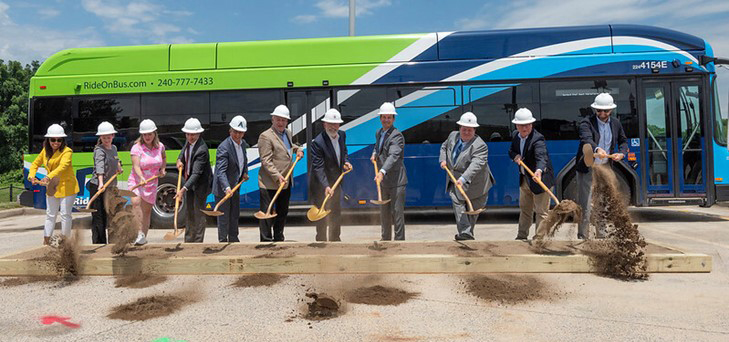MCDOT Breaks Ground on Largest Renewable-Energy-Powered Bus Depot in U.S.
6/26/2024

Executives from Montgomery County DOT (MCDOT), MD, joined local, state, and federal officials; county department representatives; and stakeholders and business leaders recently to break ground on an integrated microgrid project at the county’s David F. Bone Equipment Maintenance and Transit Operation Center (EMTOC). The EMTOC microgrid project will feature electric-bus charging and on-site green hydrogen production powered by solar and battery-energy storage.
“This project is the largest renewable-energy-powered transit depot and transit depot microgrid in the nation. It is also the first facility on the East Coast to produce green hydrogen on-site,” said County Executive Marc Elrich. “Montgomery County is providing a sustainable model for the nation to follow. We already have five microgrids in operation or development, with more underway. This project will ensure that county services are prepared for the increasingly extreme weather due to climate change as well as increasing our production of clean energy.”
Montgomery County operates the second-largest bus fleet in the Washington, DC, region, and MCDOT is the county’s largest fuel consumer, using more than 3.8 million gallons of fuel per year. By 2035, the depot is projected to accommodate 200 zero-emissions buses, of which most will be hydrogen fuel-cell electric buses (FCEBs). Fueling the county’s FCEBs with green hydrogen produced by the microgrid’s solar array advances the county’s goal of reaching a 100 percent reduction in carbon emissions by 2035.
The project is funded with little to no upfront capital to the taxpayer. County contractor AlphaStruxure provides financing, design, build, operations, and maintenance services. “It’s a joyous moment to be breaking ground on a project that is the new standard for public transit in the United States,” said Juan Macias, CEO of AlphaStruxure. “The county has proven itself as a national leader in zero-emissions transit, in part by prioritizing simultaneous procurement of both the buses and the sustainable infrastructure needed to power them.”
The county will also use the microgrid to advance equity. The microgrid will support zero-emissions buses for cleaner air and less congestion along its BRT network, which serves many minority and low-income riders. It will also support new career and training opportunities for underserved communities through a county apprenticeship program.
“Transitioning to green transit is better for our commuters and the health of our communities,” said Sen. Chris Van Hollen (D-MD). “That’s why I worked to secure funding to support Montgomery County’s efforts to move to a fully zero-emission bus fleet fueled by renewable power.”
The microgrid’s construction is expected to be completed in 2025, when the system will begin sending renewable energy back to the grid.